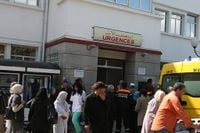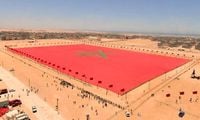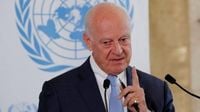In a significant development regarding the long-standing territorial dispute over Western Sahara, the United Nations Security Council convened on April 14, 2025, to discuss the ongoing situation and potential resolutions. The session featured a presentation by the UN's personal envoy for Western Sahara, Stephane Di Mistura, who emphasized the autonomy proposal as a viable solution for the region.
According to Moussaoui Ajlawi, an expert in international relations at the Center for Africa and Middle East Studies, the insights provided by Di Mistura during the session signal a shift towards the autonomy plan, which has gained traction as a solution to this protracted conflict. Ajlawi noted that Di Mistura’s report aligns with Security Council Resolution 27/56, which mandates the UN Secretary-General to present options and assessments regarding the situation in Western Sahara.
Di Mistura's report outlined two main points: the renewal of the UN mission’s mandate in the region for another year and the progress made in negotiations regarding the autonomy initiative. Ajlawi highlighted that Di Mistura's focus on the autonomy proposal is crucial, as it reflects a growing consensus among key international players, including the United States and France, regarding Morocco's sovereignty over the region.
"The report contained 16 points that underscored the need for a new vision from the Security Council to resolve this conflict through the extension of the mission's mandate," Ajlawi explained. He pointed out that the envoy's findings reaffirmed the United States' support for Morocco’s claims over Western Sahara, particularly during discussions with US political representatives.
Furthermore, Ajlawi noted the absence of any mention of self-determination in Di Mistura's address. Instead, the emphasis was placed on a realistic autonomy initiative that Morocco is encouraged to elaborate on. This shift in focus is significant, as it aligns with the Biden administration's approach to the issue.
In contrast to this positive momentum for Morocco, the report also acknowledged the complex dynamics involving Algeria, which has historically supported the Polisario Front's claims for independence. Ajlawi remarked that the meeting between the French Foreign Minister and the Algerian President, which did not address Western Sahara, indicates a clear stance from two permanent members of the Security Council. This development could influence future negotiations and the overall resolution process.
As the geopolitical landscape evolves, Ajlawi pointed out that Russia and China hold key positions. While China has shifted its stance in favor of Morocco following strengthened bilateral relations, Russia maintains reservations about the US-led initiative, indicating a nuanced approach to the conflict.
In a broader context, the April 14 session of the Security Council is seen as pivotal, marking a potential turning point in the narrative surrounding the Western Sahara dispute. The report presented by Alexander Ivanko, the head of the MINURSO mission, challenged the claims made by the Polisario Front regarding ongoing military confrontations. Ivanko stated unequivocally that there is no real war occurring in the region, countering assertions of daily battles and significant losses.
His remarks underscored the UN’s ongoing monitoring of the situation, confirming that no signs of military escalation have been detected. This assessment is crucial as it dismantles the narrative propagated by the Polisario and its supporters, particularly in light of their withdrawal from the ceasefire agreement in 2020.
Moreover, Ivanko praised the Royal Armed Forces of Morocco for their restraint, despite possessing clear military superiority. He commended Morocco's respect for international legitimacy, contrasting it with the Polisario’s continued threats of conflict and misinformation campaigns.
Reflecting on the current state of affairs, Ajlawi expressed optimism about Morocco's position. He stated, "All political and diplomatic indicators suggest that Morocco is nearing a resolution in its territorial dispute. As we approach the 50th anniversary of the Green March on November 6, 2025, Morocco is poised to celebrate not only its historical struggle but also the potential closure of a long-standing conflict."
As the situation develops, the international community watches closely, particularly with the upcoming commemorative events marking the Green March. The outcomes of these discussions and the evolving diplomatic relations will likely play a critical role in shaping the future of Western Sahara and the broader regional dynamics.
In conclusion, the April 14 Security Council meeting marks a significant moment in the ongoing dialogue surrounding Western Sahara, with the autonomy proposal gaining recognition as a potential pathway to resolution. The interplay of international relations, particularly involving key players like the US, France, and Algeria, will continue to influence the trajectory of this enduring conflict.






